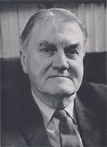day by day: a blog
October 26, 2008
chez maximes
 [photograph by Billett Potter]
[photograph by Billett Potter]
Where does a scholarly passion come from? And how does it relate to your life?
My grandfather taught French literature, especially "classical" -- that is, 17th and 18th century -- prose and drama, at Oxford. He always seemed to me the gentlest, most chivalrous and spiritual of men. I remember him as very tall, very calm, very quiet, and, more often than not, as smiling benignly.
Whenever, as a child, I went to stay with him our asymmetric (him lofty, me stumpy) morning progresses along St. Giles were heavily punctuated by moments when he slowed and raised his hat as a lady passed. (He was the last Englishman of my acquaintance who, as a matter of course, both wore a hat in the street and lifted it off briefly in the presence of numerous women, apparently whether or not he knew the people in question closely.) I also recall a careful and only moderately unironic explanation to me of the difference between "un homme gentil" and a "gentilhomme".
I loved his humour, his fastidiousness of dress, his gentleness. But, when I grew up a bit, his ethical values also came to seem impeccable. As a young man, he had been sent as a representative of the Congregationalists in Britain to attend Martin Niemöller's trial for offenses against the State before a "Special Court" in Germany in March 1938. The Nazis refused him admission. In the 1960s he and my grandmother were active in the British wing of the campaign against apartheid.
After my grandmother died, he spent a little less than a year grieving for her. Much of that time, the book propped open next to his cold suppers, he devoted to reading Thomas Hardy's poetry, including "Poems of 1912-13", Hardy's elegies for his wife. Then he followed her into oblivion.
Yet -- the things he had written about.... Take an example. One of his books is La Rochefoucauld: His Mind and Art (1969). Have you read La Rochefoucauld? His prose is like an acid: "Les vertus se perdent dans l'intérêt comme les fleuves se perdent dans la mer". It is Nietzsche before Nietzsche. "Dans toutes les professions chacun affecte une mine et un extérieur pour paraître ce qu'il veut qu'on le croie. Ainsi on peut dire que le monde n'est composé que de mines."
I love my grandfather's memory; I will never forget him. To me he will always be "past love, praise, indifference, blame." Still, the apparent cleavage between the man who played and the scholar who wrote is striking to me. Do our words and our characters ever truly unite? I wonder sometimes whether I, or anyone else, knew my grandfather entirely? Or whether, so to speak, his work knew him? And then I wonder whether anyone -- perhaps, my as-yet unborn grandchildren -- will ever ask the same kinds of question about me? Will they ponder languidly: "Where was the poetry in him?" There are no easy answers.
Posted by njenkins at October 26, 2008 06:52 PM
With the exception of interspersed quotations, all writing is © 2007-09 by Nicholas Jenkins